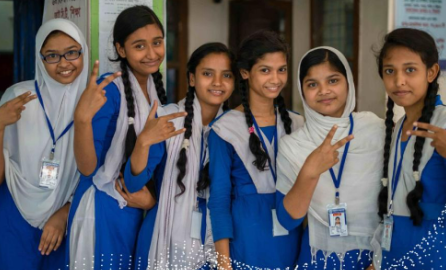STEAM Ahead: marginalised children in Nepal

-
Gender marker: G1-Promotes gender equality as a significant objective
-
Period of implementation: 2021-2024
-
Amount: EUR 730,000
-
Geographical area: Asia and the Pacific
-
Implementing partners:
-
Plan International in Germany and in Nepal (Lead Implementing Partner)
-
Women in Science, Technology, Engineering and Mathematics (WiSTEM)
-
-
Link to the project:
-
GAP III’s Areas:
-
Economic and social empowerment
-
Equal participation and leadership
-
Green and digital transformation
-
In Nepal, a multitude of interacting factors such as gender, poverty, ethnicity and caste segregation drive inequality in education. Nepal has a low overall literacy rate (67%) and Dolpa, a remote district in the mountains of Karnali province, ranks in the bottom ten of all districts with a literacy rate of 54.1%. A combination of structural factors has contributed to Dolpa’s especially low mark, including socio-cultural, economic, geographical and infrastructural issues.
Girls in Nepal face particular barriers. They are forbidden by their parents to go around by themselves, inhibited from studying and are at high risk of child marriage, whether forced by the family or by eloping. These girls are normally responsible for most of the unpaid work performed within the family. Parents see investing in their daughters as an economic loss. This is even worse for girls (and boys) with disabilities, who are seen as a burden and shame on the family.
The EU-funded STEAM (Science, Technology, Engineering, Arts and Mathematics) Ahead project aims to improve access to quality education, especially for girls, by working with the local government, communities, schools, students and organisations to strengthen the education system in Dolpa. Together with Plan International (PLAN) in Germany and local partners such as the Social Awareness Centre (SAC) Nepal, Women in Science, Technology, Engineering and Mathematics (WiSTEM) and Open Learning Education (OLE), this project aims to systematically strengthen the capacity of civil society to influence the education system to meet the needs of girls and boys, including those with disabilities.
Some of the activities with these groups include:
-
Supporting local government authorities, CSOs and schools in planning participatory, data-driven, gender-responsive and inclusive quality education (in local languages).
-
Providing a safe environment for students, increasing child-centred learning methods and ensuring institutionalised complaint mechanisms in schools.
-
Supporting menstrual hygiene management and improved access to sanitation and health services in schools to address one of the biggest barriers for teenage girls to attend school.
-
Providing technical and financial support to improve the resilience of education systems, for example, through the establishment of distance learning and home-based learning options.
-
Developing technology-friendly infrastructure in 50 schools and the wider community to increase children’s access to digital and STEAM learning.
-
Ensuring the availability of basic inclusive quality learning resources (digital and print), especially user-friendly materials for children with specific needs.
-
Supporting teachers to teach children with specific needs, such as boys and girls with hearing or visual impairments.
This EU-funded project has strong synergies and complementarity with the ongoing Team Europe Initiative (TEI), in the sectors of water and sanitation, agroforestry, climate change and resilience. It will also connect with the future education sector TEI (2023-2024). STEAM has assisted in improving education worldwide and is now building a stronger Nepal to achieve Sustainable Development Goals – especially Goal 4, which aims at Quality Education for All.
Working with students, teachers, mayors and parents alike, STEAM Ahead will create an informed, responsive and accountable education system so that children’s dreams can become reality.
“Education is vital, and it is the beacon of light that shines even in the darkness. Without education, life is bleak.” Bandana, a student at Tripura Secondary School in Dolpa, Karnali Province. She dreams of becoming an engineer after finishing her secondary school studies.
